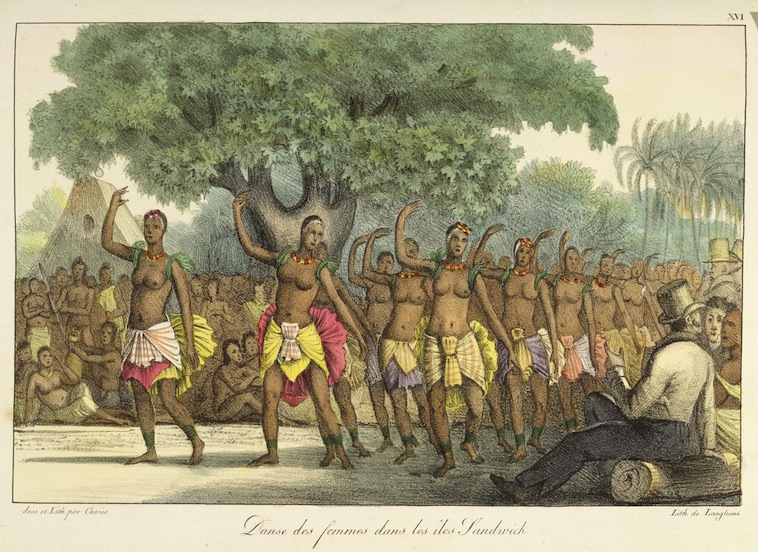Isaak Iselin in Hawaiʻi, 1807
 Dancing women before a Euroamerican spectator. Is it for the barebreasted women that painter Louis Choris depicts the viewer looking away?
Dancing women before a Euroamerican spectator. Is it for the barebreasted women that painter Louis Choris depicts the viewer looking away?
Choris, Louis: Voyage pittoresque autour du monde, Paris 1822, pl. 16.
Women and Men
An interesting and complex aspect of Iselin's Hawaiian journal is gender. Iselin includes observations about gender relationships in Hawaiian society and notes the interactions between the exclusively male crew of the Maryland and Hawaiian woman.
Gender relationships, including sexual behaviour, were practiced in fundamentally different ways in Hawaiʻi than in the Christian societies with which Iselin was familiar. In European terms, Hawaiʻi was a sexually very open society. Sexual intercourse had, amongst other things, the meaning of receiving or giving mana (see Through Hawaiian Eyes I — Task), a meaning which embedded it in the Hawaiian societal cosmos.
In the early–nineteenth century, Hawaiians categorized the EuroAmerican visitors as aliʻi. As a consequence, the women of the islands often boarded the ships and had sexual intercourse with the men, thus gaining prestige. Westerners often misunderstood this behaviour as prostitution, because the women often also took presents from the men.
That Hawaiian sexuality and perceived «sexual» practices including the hula were demonized by the influential New England Puritan missionaries from the 1820s onwards, and that a prostitution business with the same aspects of female exploitation as elsewhere in the EuroAmerican world replaced it, is another story.
As a Protestant from Basel, Isaak Iselin shared a rather Puritan view of sexuality and nudity. Those topics are therefore rarely mentioned in his journal, or if so in veiled language. When he writes «a great many females come swimming to the ship» or «the females are not backward in coming on board» he is probably hinting at more than just a casual visit. Iselin of course reveals more about his own imagination of the world than that of the Hawaiians when, for example, he recounts that the islanders are «void of the notions we have of morality».
